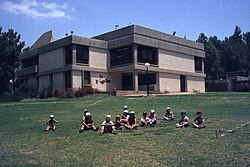Hukok
Hukok חוּקוֹק | |
|---|---|
 Hukok dining hall, 1980 | |
| Coordinates: 32°52′48″N 35°29′45″E / 32.88000°N 35.49583°E | |
| Country | |
| District | Northern |
| Council | Emek HaYarden |
| Affiliation | Kibbutz Movement |
| Founded | 1946 |
| Founded by | Mikveh Israel graduates and Noar Oved members |
| Population (2022)[1] | 646 |
Hukok (Hebrew: חוּקוֹק) is a kibbutz in Israel. Located near the Sea of Galilee and the cities of Tiberias and Safed, it falls under the jurisdiction of Emek HaYarden Regional Council. In 2022 it had a population of 646.[1]
History
[edit]
In 1945, the Hukok fort was built by the Solel Boneh company as a strategic settlement post and named after the biblical village of Huqoq (Joshua 19:34),[2] the supposed burial place of the prophet Habakkuk.[3] It stood near the Palestinian village of Yaquq.[3]
The kibbutz was established in 1946 by graduates of the Mikveh Israel agricultural school and members of the HaNoar HaOved VeHaLomed youth movement.[4]
Yaquq was depopulated on May 1, 1948 during the civil war phase of the war.[5]
After the 1948 war, the fort was used as an absorption center for new immigrants.[4]
Between 2002 and 2003, as part of a nationwide program, the kibbutz took in 76 immigrants (22 families) from Latin America, of whom 58 remained.[6]
Economy
[edit]In addition to agriculture, the kibbutz runs a plastics factory, Hukok Industries. The kibbutz operates a private beach on Lake Kinneret that was awarded a Blue Flag for environmental excellence in 2013.[7]
Notable people
[edit]- Tuvia Katz (born 1936), abstract painter
References
[edit]- ^ a b "Regional Statistics". Israel Central Bureau of Statistics. Retrieved 21 March 2024.
- ^ Carta's Official Guide to Israel and Complete Gazetteer to all Sites in the Holy Land. 3rd edition, 1993, Jerusalem: Carta, p. 204, ISBN 965-220-186-3
- ^ a b Ben Yosef, Seffi (March 21, 2007). "Ein Hokuk and the story of Habakkuk". YNet News. Retrieved April 19, 2019.
- ^ a b "Hokuk Fortress". Archived from the original on 2016-04-15. Retrieved 2016-04-04.
- ^ Morris, 2004, p. xvii, village #73. Gives cause of depopulation as "?"
- ^ Ashkenazi, Eli (February 13, 2004). "Kibbutzim opened doors to 930 new immigrants in 2003". Haaretz. Retrieved April 19, 2019.
- ^ Udasin, Sharon (April 28, 2014). "21 Israeli beaches, 2 marinas receive Blue Flag label for environmental quality". The Jerusalem Post. Retrieved April 19, 2019.
External links
[edit]- OR Movement web site Retrieved on 24 May 2009


 French
French Deutsch
Deutsch
